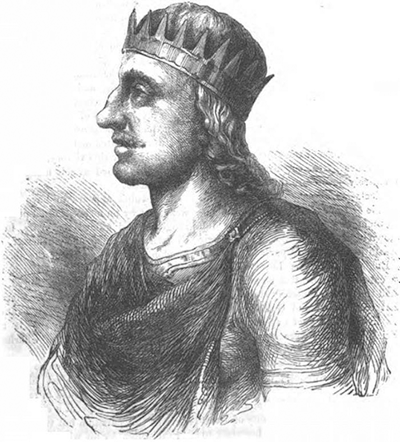








Battle of Ellandun (825):
Egbert’s decisive victory over Mercia at the Battle of Ellandun marked a turning point in Anglo-Saxon history. The battle, fought near modern-day Swindon, ended Mercian dominance in southern England. This victory allowed Egbert to annex Kent, Sussex, Surrey, and Essex, significantly expanding his realm.
Born: c. 771
Died: 839 (aged approximately 68)
Mother: Unknown (not recorded in historical sources)
Father: Ealhmund of Kent
Wife: Redburga (possibly a Frankish noblewoman, though details are debated)
Children:
Æthelwulf (later King of Wessex)
Other children are less reliably recorded in historical sources.
Successor: Æthelwulf (his son)
Predecessor: Beorhtric (King of Wessex before Egbert; ruled 786–802)
King Egbert of Wessex – Quick Stats
Historical Significance
Egbert’s reign is seen as the beginning of the movement toward English unification. While he did not create a fully united England, his victories over Mercia and his expansion of Wessex’s influence laid the groundwork for the future integration of the Anglo-Saxon kingdoms.
His title of Bretwalda symbolized his status as a ruler of unparalleled authority during his time. Although his dominance over some regions, like Mercia and Northumbria, was temporary, his impact on the political and cultural landscape of early medieval England was profound.
Egbert’s contributions ensured that Wessex became the preeminent kingdom in England, a legacy carried forward by his descendants, who would go on to unify the country under one crown. His reign represents the dawn of a new era, shaping the trajectory of English history for centuries to come.
Egbert’s reign is seen as the beginning of the movement toward English unification. While he did not create a fully united England, his victories over Mercia and his expansion of Wessex’s influence laid the groundwork for the future integration of the Anglo-Saxon kingdoms.
His title of Bretwalda symbolized his status as a ruler of unparalleled authority during his time. Although his dominance over some regions, like Mercia and Northumbria, was temporary, his impact on the political and cultural landscape of early medieval England was profound.
Egbert’s contributions ensured that Wessex became the preeminent kingdom in England, a legacy carried forward by his descendants, who would go on to unify the country under one crown. His reign represents the dawn of a new era, shaping the trajectory of English history for centuries to come.
King Egbert of Wessex: The Father of English Unification
King Egbert (c. 771-839), ruler of Wessex from 802 to 839, stands as one of the most influential early Anglo-Saxon kings. His reign marked a crucial turning point in English history, as he laid the foundations for the eventual unification of England. Through military victories, political acumen, and administrative foresight, Egbert transformed Wessex into the dominant kingdom of southern England.
Early Life and Exile
Egbert was born around 771 into the House of Wessex, a ruling dynasty that traced its lineage back to legendary figures of Anglo-Saxon history. His father, Ealhmund of Kent, briefly ruled Kent before being displaced, leaving Egbert’s early life marked by political instability. Details about Egbert’s mother are not recorded, reflecting the limited documentation of women in this era.
Egbert was born around 771 into the House of Wessex, a ruling dynasty that traced its lineage back to legendary figures of Anglo-Saxon history. His father, Ealhmund of Kent, briefly ruled Kent before being displaced, leaving Egbert’s early life marked by political instability. Details about Egbert’s mother are not recorded, reflecting the limited documentation of women in this era.
Egbert’s claim to the throne of Wessex was challenged by powerful rivals, particularly Offa of Mercia and Beorhtric of Wessex, who aligned against him. To escape this opposition, Egbert fled to Frankia, seeking refuge at the court of Emperor Charlemagne in the late 8th century.
During his time in exile (c. 789-802), Egbert likely absorbed the administrative and military strategies of Charlemagne’s empire, one of the most advanced political entities in medieval Europe. This period of observation and learning profoundly influenced his later rule.
Ascension to Power
Egbert’s return to Wessex and ascension to the throne occurred in 802 following the death of King Beorhtric. Beorhtric’s passing was reportedly caused by poisoning at the hands of his wife, Eadburh, the daughter of Offa of Mercia. With no immediate challenger to the throne, Egbert seized the opportunity to take power.
Egbert’s return to Wessex and ascension to the throne occurred in 802 following the death of King Beorhtric. Beorhtric’s passing was reportedly caused by poisoning at the hands of his wife, Eadburh, the daughter of Offa of Mercia. With no immediate challenger to the throne, Egbert seized the opportunity to take power.
Upon becoming king, Egbert inherited a kingdom overshadowed by the supremacy of Mercia, which dominated southern England. His early reign focused on consolidating power within Wessex and maintaining its independence against Mercian influence.
Military and Political Achievements
Egbert’s reign is most notable for his military successes and the territorial expansion of Wessex. These achievements transformed Wessex from a regional power into the dominant Anglo-Saxon kingdom.
Egbert’s reign is most notable for his military successes and the territorial expansion of Wessex. These achievements transformed Wessex from a regional power into the dominant Anglo-Saxon kingdom.
Conquest of Mercia and Northumbria (829):
In 829, Egbert launched a campaign against Mercia, overthrowing its king, Wiglaf, and temporarily ruling the kingdom. Following this success, Northumbria submitted to Egbert without a fight, making him the first Anglo-Saxon king to assert control over nearly all of England.
In 829, Egbert launched a campaign against Mercia, overthrowing its king, Wiglaf, and temporarily ruling the kingdom. Following this success, Northumbria submitted to Egbert without a fight, making him the first Anglo-Saxon king to assert control over nearly all of England.
This achievement earned Egbert the title of Bretwalda, meaning "Ruler of Britain," a recognition of his overlordship over other Anglo-Saxon rulers. However, his control over Mercia and Northumbria was short-lived, as Mercia regained independence under Wiglaf within a year.
Defensive Campaigns Against Viking Raids:
Egbert also faced the rising threat of Viking invasions, which began to intensify during his reign. While unable to completely eliminate the Viking menace, Egbert’s military organization ensured Wessex remained resilient against these incursions.
Egbert also faced the rising threat of Viking invasions, which began to intensify during his reign. While unable to completely eliminate the Viking menace, Egbert’s military organization ensured Wessex remained resilient against these incursions.
Governance and Administration
Egbert’s achievements extended beyond the battlefield. His ability to consolidate and administer his expanding territory set him apart from many of his contemporaries. By uniting southern England under the control of Wessex, Egbert began a process of political centralization that would be further advanced by his descendants.
Egbert’s achievements extended beyond the battlefield. His ability to consolidate and administer his expanding territory set him apart from many of his contemporaries. By uniting southern England under the control of Wessex, Egbert began a process of political centralization that would be further advanced by his descendants.
Egbert allowed local rulers in annexed territories to govern under his authority, striking a balance between autonomy and central oversight. This pragmatic approach minimized resistance and fostered stability in the regions he controlled. His administrative reforms helped to establish Wessex as the most organized and powerful kingdom in England.
Family and Legacy
Egbert was married to Redburga, a figure who remains somewhat enigmatic in history. Some accounts suggest she was of Frankish noble birth, possibly related to Charlemagne, though these claims remain unverified. Together, they had at least one prominent son: Æthelwulf, who succeeded Egbert as King of Wessex and continued his father’s work of defending and expanding the kingdom.
Egbert’s family line would go on to produce some of the most iconic figures in English history, including Alfred the Great, his great-grandson, who is credited with formalizing the unification of England.
Egbert was married to Redburga, a figure who remains somewhat enigmatic in history. Some accounts suggest she was of Frankish noble birth, possibly related to Charlemagne, though these claims remain unverified. Together, they had at least one prominent son: Æthelwulf, who succeeded Egbert as King of Wessex and continued his father’s work of defending and expanding the kingdom.
Egbert’s family line would go on to produce some of the most iconic figures in English history, including Alfred the Great, his great-grandson, who is credited with formalizing the unification of England.
Death and Succession
Egbert died in 839 after a reign of 37 years. His death marked the end of a transformative era for Wessex. He was succeeded by his son Æthelwulf, who inherited a kingdom significantly larger and more powerful than it had been at the start of Egbert’s reign. Egbert was buried in Winchester, which would later become the political and spiritual center of Wessex. His reign left an enduring legacy as a pivotal figure in the consolidation of Anglo-Saxon England.
Egbert died in 839 after a reign of 37 years. His death marked the end of a transformative era for Wessex. He was succeeded by his son Æthelwulf, who inherited a kingdom significantly larger and more powerful than it had been at the start of Egbert’s reign. Egbert was buried in Winchester, which would later become the political and spiritual center of Wessex. His reign left an enduring legacy as a pivotal figure in the consolidation of Anglo-Saxon England.


